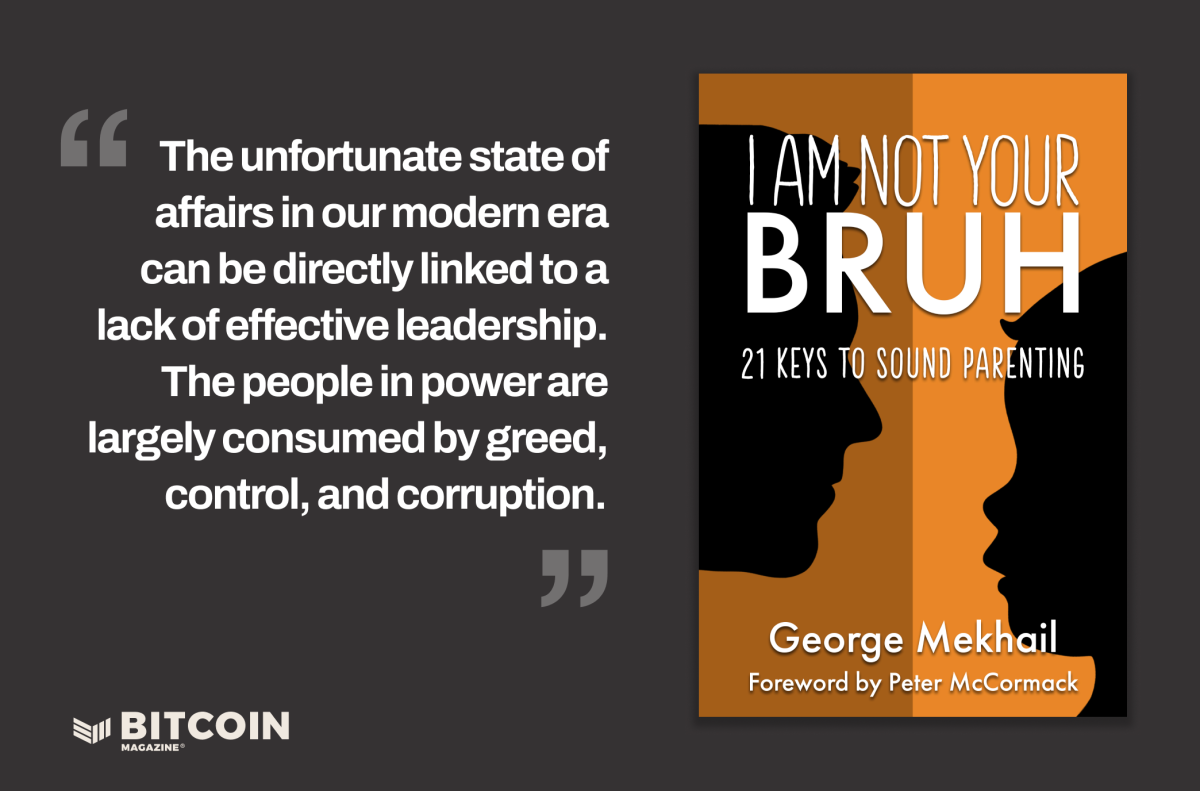Make Good Choices, Be Good Leaders

The following is an excerpt from “I Am Not Your Bruh: 21 Keys to Sound Parenting” by George Mekhail. Visit the Bitcoin Magazine Store to order your copy of the book, on sale today.
I started using this phrase as my last words to children when I dropped them off at elementary school and I still use it to this day as they prepare to go out with friends or leave the house. Danielle and I often talk about one of our main goals in parenting is to raise children who become leaders. The concept of leadership in our world has become complicated if not confusing. Leadership is not the same as authority and it is not the same as popularity. Just because you are the President of the United States, does not make you a leader, or at least, does not automatically make you a model leader. Being a celebrity is not the same as being a leader who deserves to be followed, even though many celebrities brag about the many “followers” they follow on social media, watch everything they do in the press, or admire them as role models. Effective leadership has become the only thing in the world that is scarcer than Bitcoin.
The sad state of our present time can be directly linked to the lack of effective leadership. People in power are primarily full of selfishness, control, and corruption. This is partly due to a woefully misaligned incentive structure fueled by a broken financial system, which allows the rich to get rich easily and the corrupt to run unchecked in their corruption. We’ll explore this topic in more depth later, but it’s almost as if things have gotten so bad that those in power don’t even bother with visuals anymore. They flaunt and mock their oppression as if to say, “What are you going to do about it?” I believe part of the answer to that question requires playing the long game with Sound Parenting. If the next generation of parents commits to the vision of raising the next generation of strong leaders, we will begin to make meaningful progress in humanity’s collective struggle for the goals of freedom, peace, and prosperity. If you look at all the historical achievements in times when people fought and succeeded in the face of violence, you will find examples of strong leadership. At the end of the day, someone has to raise the next George Washington, and there’s no reason it can’t be me or you.

Take it seriously
I find it funny when people say, “Don’t take yourself too seriously.” It’s like, how should I take them? I am a light-hearted person; I like to make people laugh: I can also be loud with my positive attitude. Life is too short, I am asking to be taken by the horns and molded into all my hopes and dreams. In that sense, I can say that I take myself seriously. If you don’t take yourself seriously, you certainly shouldn’t expect anyone else to take you seriously. And what a hard way to live this one precious life. I say: take it seriously. Have high goals. A big dream. It always fails. Show. Keep moving forward. Laugh out loud. Take risks. Be more. Don’t fence. And most importantly: teach your children to do the same. Don’t listen to the insecurities of others who need you to lose weight so they can feel better about themselves. Don’t stop dreams before they even have a chance to see the light of day. The world needs more courage, more courage, and more outsiders who aren’t afraid to stand up to the bulls. I assure you that all the heroes of history take themselves seriously, take their dreams seriously, and take their business seriously. Make no mistake, this is an active, ongoing, ongoing decision that requires constant reflection and self-awareness. It doesn’t need to anxiety about what people think of you. Every time you decide to take yourself seriously, you are taking steps to not only reach your goals, but also fulfill your God-given potential.
Take Responsibility
Each of our lives can be boiled down to a series of decisions. Every day we become a person, and the person we become is shaped by the choices we make. With every situation we face, we can decide: how am I going to go about this? It’s our answer to every question that comes up, whether it’s expected, fair, or difficult. The truth is that each of us is equipped with the ability to assess these situations and determine the best course of action. The combination of using our abilities to respond appropriately reflects one of the most beautiful words in the English language: responsibility. Seriously, can we take a moment to appreciate how rich this word is and how important it is in this game of life? Making good choices and being good leaders requires commitment. Teaching our children how to take responsibility for their own lives is a fundamental goal of good parenting. A child’s steps to achieving this result begin with helping them see the real-world impact of every decision. Pushing the picture further, helps them see how much their current situation depends on the many decisions they’ve made. Yes, everyone has different abilities. Of course, everyone has different response tools at their disposal. But in the same way, everyone has the opportunity to accept his set of responsibilities based on the circumstances he is given. The mark of effective leadership is found in a person’s willingness to take on greater responsibility than could reasonably be expected of them. Strong leaders crave responsibility and tend to seek it continuously. In turn, they also tend to make wise, thoughtful, and purposeful decisions in every situation they face.
On the other hand, poor decision-making can be defined as the inability to respond effectively to a given situation. Let’s call the inability to answer fun. This is often a sign not only of poor leaders but also of those we might describe as sheep, NPCs, or blind followers. Consider how many bad decisions are made because of “peer pressure” or “following orders.” These are not the kind of children we are trying to raise. We want lions, not sheep. The world is sadly full of uncritical thinkers who raise uncritically thinking children who lack the tools to accept responsibility—and who would rather have someone else make their own decisions. Bad decisions often come together, unfortunately much faster than smart decisions. If this impulse continues, you have a recipe for addiction, pain, and ultimately regret.
No Regrets When You Are 80
As far as we know, we only live once. There will only ever be one George Samir Naguib Mekhail Saad Nasir Massoud. Although it can be useful to have, there is no undo button in life. You cannot dictate to Z your way of life. “There are no regrets when you’re 80” is more of a personal refrain than I’ve taken, but I’ve used it with my kids to help show the implications and importance of making decisions and numbering your days. We all regret it; things we wish we could have done differently or things we wish we could change. I consider the concept of regret to be strictly defining something that is immutable. Many times we apply the word regret to situations that can be changed but that may be too difficult or require suffering to make said change a reality. Some people will say, “I’m sorry about how things turned out with Justine,” when in reality, they could pick up the phone and call ol’ Justine to mend the relationship. You may not need to call her today, but maybe sometime before you turn 80 you can cross at least one regret off your list. I remind myself of this mantra when I am faced with a very big decision to help me put the options in perspective. The question of this phrase is: if I decide to do X, how likely is it that I will regret this decision when I die?
It’s helpful to realize that the idea of avoiding regret can turn into an unhealthy obsession, which can cause a person to limit risk-taking and exercise prudence. This is not what I am suggesting. Instead, we must find a healthy balance when it comes to the limiting circumstances in which irreversible regret is created. Most importantly, we must train our children in the importance of making decisions at an early age and help them understand how these decisions will add up, like interests, later on. The sooner our children learn to be responsible in all of life’s actions, the more mature, intelligent, and independent they will be. Good decisions lead to being a great character. Great character produces great leaders. Good leaders, raise children who pass through all stages because that was the goal all along.

Source link




